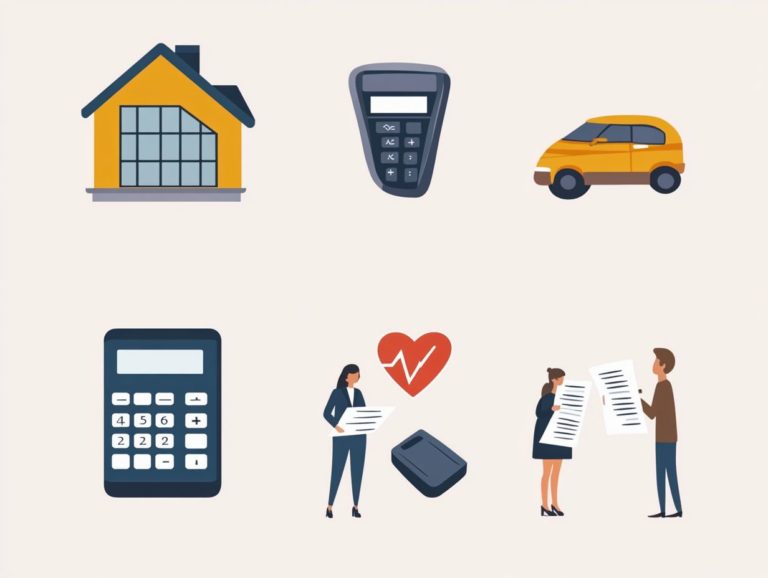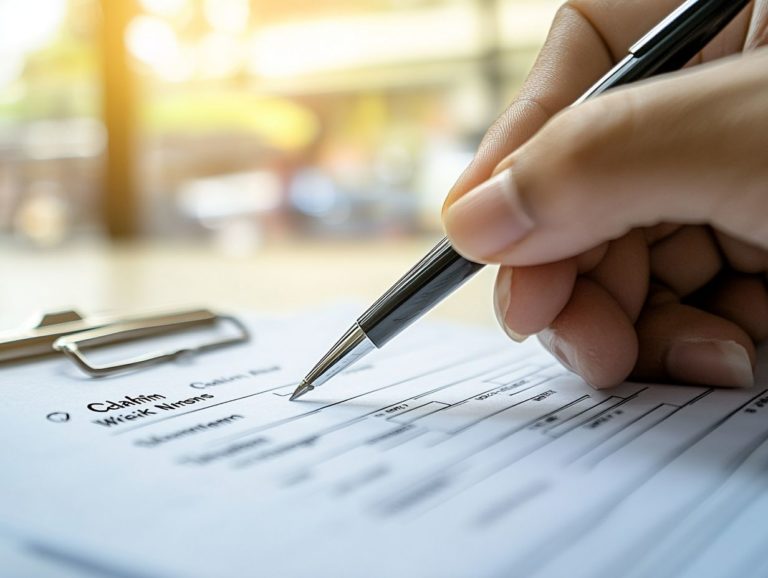What Should I Do If My Car Is Totaled?
If you ve recently experienced an accident and are concerned about the status of your vehicle, it s crucial to grasp the concept of a totaled car.
This article will clarify what constitutes a total loss, outline the key steps you should follow after the incident, and explore the options available for managing your totaled vehicle.
Delve into the factors that affect its value and master the insurance claims process. Whether you re weighing the merits of repairs, replacements, or salvage options, this information will serve as your comprehensive guide.
Contents
Key Takeaways:
- Contact your insurance company immediately and gather all necessary documents when your car is totaled.
- Consider your options for dealing with a totaled car, such as repairing or replacing it, or selling it for salvage.
- Factors such as age, condition, and insurance coverage can affect the value of your totaled car.
Understanding What it Means for a Car to be Totaled
When a vehicle is considered a total loss, it means that the repair costs exceed its fair market value, leading the insurance company to label it a total loss. This categorization can profoundly affect your car insurance premiums and financial responsibilities, especially if you still have outstanding loan payments on the vehicle.
Understanding the implications of this term is essential, particularly after an auto accident, as insurance companies must navigate state laws and the intricate details of the payout process.
Definition of Total Loss
A “total loss” is declared when the repair costs for your damaged vehicle exceed its fair market value. This prompts insurance companies to label it a totaled car.
This designation isn t arbitrary; it involves a meticulous assessment of your vehicle’s make, model, year, and condition before the accident, along with an analysis of comparable sales in your area. Insurance adjusters frequently use valuation tools and databases to determine an accurate figure that reflects current market conditions.
As a vehicle owner, this total loss designation can significantly impact the claims process. It often means the payout won t be enough to cover the cost of a new vehicle, making it crucial to understand the potential payout implications.
Thus, navigating this process requires careful attention to detail. The difference between being underinsured and receiving fair compensation hinges on the accuracy of these evaluations.
Steps to Take After Your Car is Totaled
After the unfortunate event of totaling your car, it s crucial to follow a clear set of steps to facilitate a smoother insurance claim process.
- Begin by promptly notifying your insurance company and gathering all necessary documents.
- Engage in effective communication with your insurance adjuster to share relevant details from your policy concerning collision and comprehensive coverage.
- Know your state laws regarding total loss to speed up the claims process, ensuring that you navigate this challenging situation with confidence and efficiency.
Notifying Insurance and Gathering Necessary Documents
Don t delay! Notify your insurance company right after the accident to ensure a smoother claims process. Promptly informing them is essential when your car is totaled, as they will require specific documents to process your claim efficiently.
Be ready to provide a police report, which is crucial for validating the incident. Gathering photos of the damaged vehicle can greatly enhance your claim, as visual evidence often leads to quicker assessments.
It s wise to compile any relevant information, such as witness statements or repair estimates, to further strengthen your position.
When communicating with the insurance adjuster, clarity is paramount. Keeping discussions concise and focused on the facts can help you navigate the process smoothly.
Don’t hesitate to ask questions if any part of the process is unclear ensuring that both you and the insurance company remain aligned throughout the settlement journey is key.
Options for Dealing with a Totaled Car
When your car is declared totaled, you have several options that require careful thought. You ll need to decide whether to repair the vehicle or replace it entirely. You might also consider selling it for salvage.
Each of these choices affects your insurance payout and can influence your next steps, especially if you have gap insurance which covers the difference between what you owe on your car loan and its current market value or outstanding loan payments. Understanding the role of salvage yards can open up additional recovery options and help you navigate this challenging situation more easily.
Repairing vs. Replacing
Finding yourself with a totaled car means you must decide whether to repair it or get a replacement vehicle. This choice can significantly influence your overall insurance payout.
Several factors come into play, including the estimated repair costs, the current market value of your vehicle, and the methods insurance companies use to assess payouts for totaled cars. For instance, if the repair costs exceed the vehicle’s market value, choosing a replacement could be the more economical option.
Insurance policies often factor in depreciation, which can greatly affect payouts, particularly when damage is extensive. You may find that a minor accident results in a higher insurance settlement than expected, allowing you to upgrade your replacement option. Conversely, challenges may arise if the damage is repairable but comes with a steep price tag.
Thus, it’s essential to assess the overall financial implications carefully.
Selling for Salvage
Selling a totaled car for salvage can be a smart choice, letting you recoup some value through a salvage yard.
The process generally starts with an appraisal, where salvage yards evaluate your car s condition based on factors like make, model, and the extent of the damage. Be sure to gather necessary documentation, such as the title and vehicle history, to streamline the transaction.
Choosing this route can be financially advantageous, potentially allowing you to receive cash on the spot and mitigate the financial strain from the accident.
When it comes to insurance claims, keep your insurance company informed about this decision to simplify communications. Many insurers recognize the value of salvage yards, viewing them as practical alternatives that can lead to a quicker resolution of claims while protecting you from financial losses.
Factors That Affect the Value of a Totaled Car
The value of a totaled car is influenced by key factors you should consider. These include the age and condition of the vehicle, the extent of the damage, and the specifics of your insurance coverage.
Understanding these aspects will help you navigate the complexities of assessing your car’s worth effectively.
Age and Condition of the Car
The age and condition of your car are crucial in determining its overall value when evaluating a total loss.
As your vehicle ages, its market value depreciates due to normal wear and tear. The car’s condition whether it has been in accidents or how well it has been maintained will significantly influence its worth. A well-cared-for vehicle with a clean accident history retains more value than one that has suffered multiple collisions or has been neglected.
During the insurance claims process, insurers will closely examine these factors, meaning the compensation you receive can vary greatly based on your vehicle’s care throughout its life.
Don t miss out on this chance to make informed decisions and navigate your options effectively after a car accident!
Insurance Coverage and Policy Details
Your insurance coverage and policy details are vital in shaping your expectations for an insurance payout following a total loss.
The types of coverage you choose significantly influence this process. Collision coverage addresses damage from accidents, ensuring you receive a payout based on your car’s actual cash value. Comprehensive coverage protects against theft, vandalism, and natural disasters, which also impacts your vehicle’s valuation.
After filing a claim, you may notice that your insurance premiums increase, reflecting the higher risk associated with your status as a policyholder. Understanding these details helps you choose the right coverage and navigate potential issues during claims.
Mastering Your Insurance Claims Process
Navigating the insurance claims process after your car is totaled can feel overwhelming. However, knowing how to work closely with your insurance company, particularly understanding the role of the claims adjuster (the person who evaluates your claim), can make a world of difference in your experience.
Working with Your Insurance Company
Navigating the claims process with your insurance company is essential, and mastering the art of interaction with the claims adjuster can significantly enhance your chances of a favorable outcome.
To ensure a seamless experience, gather all pertinent documentation that supports your claim. This includes:
- Photographs of damages
- Repair estimates
- A thorough inventory of lost items
By presenting well-organized evidence, you enable the adjuster to fully grasp the extent of your loss. Don t hesitate to ask questions or seek clarification on any aspects of your policy. Clear communication can truly be the deciding factor between a modest settlement and the compensation you rightfully deserve.
Keep in mind that persistence is key; regular follow-ups will showcase your commitment to achieving a fair resolution.
Appealing a Low Payment Offer
If you believe the insurance company’s offer for your totaled car is unreasonably low, you have every right to appeal the payment offer to secure a payout that meets your expectations.
Start by gathering all relevant supporting evidence, including repair estimates, data on similar car sales, and photographs of your vehicle s condition prior to the accident. Effective communication is vital; present your appeal clearly and concisely, bolstered by the evidence you ve collected.
Understanding the payout process can significantly enhance your chances of a successful appeal familiarize yourself with your policy s terms and what the insurance company considers when determining payouts. By being organized and assertive, you can improve the likelihood of achieving a more favorable settlement that accurately reflects your car s true value.
Frequently Asked Questions
What should I do if my car is totaled?
If your car is totaled, you should first contact your insurance company to report the accident and start the claims process. They will guide you on the next steps to take.
Will my insurance cover a totaled car?
If you have collision or comprehensive coverage, your insurance should cover a totaled car. However, the amount you receive may vary depending on your policy and the value of your car.
What happens to my car after it is deemed totaled?
After your car is deemed totaled, your insurance company will typically take possession of it and sell it to a salvage yard. You might even have the chance to buy your salvaged car back!
How is a car determined to be totaled?
A car is typically deemed totaled if the cost to repair it is more than a certain percentage of its market value or if the damage is too severe for it to be safely repaired. This percentage varies by insurance company.
Can I still drive my car if it is totaled?
If your car is deemed totaled, it is not safe or legal to drive. You should stop driving it and follow the instructions of your insurance company for next steps.
Will I receive a rental car if my car is totaled?
If you have rental car coverage on your insurance policy, you may be eligible for a rental car while your claim is being processed. However, this may vary depending on your policy and insurance company.






